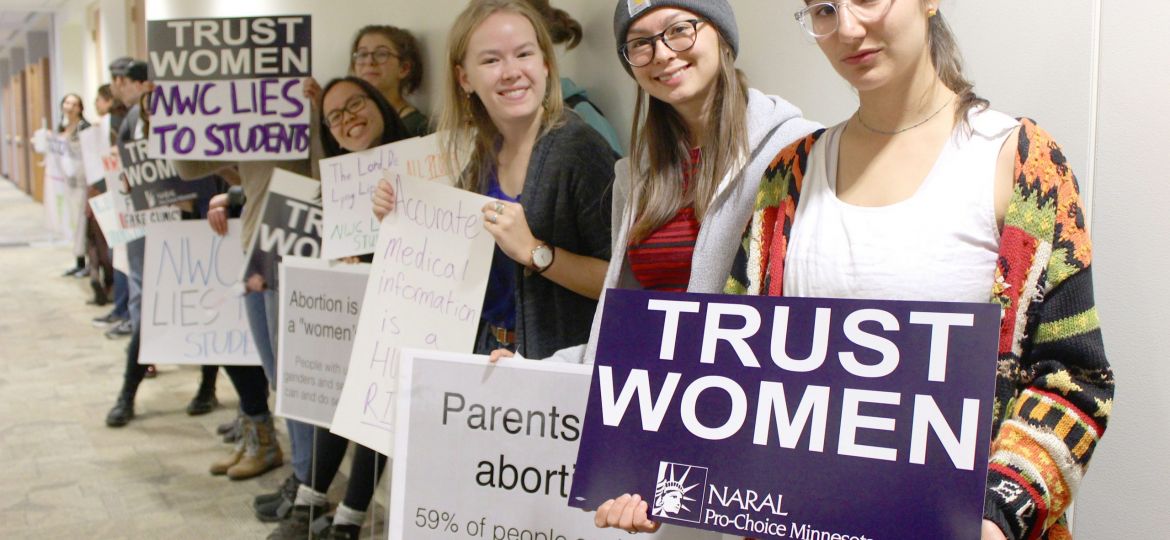
Students Advocating Reproductive Rights (SRR) held a silent protest at a fundraising event for the Northfield Women’s Center in a St. Olaf ballroom on Thursday, Oct. 26. At 6:15 p.m. students lined the hallway leading to the ballrooms, holding pro-choice signs and literature.
The Northfield Women’s Center is considered a Crisis Pregnancy Center (CPC), one of more than 4,000 that exist in the United States. The goals and ethics of CPCs are widely disputed among those who identify as either pro-choice or pro-life. CPCs generally function as federally funded centers which provide reproductive wellness resources to women facing an unwanted pregnancy. The Center offers several free services, including pregnancy confirmation, one-on-one mentoring and post-abortion support. One such service offered by the Center is the “Surrendering the Secret” program, an eight week group session that, according to the Center’s website, is designed to promote healing after having an abortion.
“Our medical services are overseen by a MD and our staff includes a registered nurse and a registered sonographer,” Center director, Liz Blanchard said. “We serve to meet the needs of each individual woman or family to the best of our ability by providing resources that help them continue to pursue education, careers and financial independence.”
However, CPCs around the country have long been regarded with skepticism by many women’s advocacy, feminist and pro-choice organizations. Many of these clinics lack licensure and employ no licensed medical professionals. Furthermore, CPCs are frequently understood as pro-life organizations that discourage women from having abortions by providing misleading counseling and literature under the guise of medical reproductive wellness information.
These concerns were among Sophie Wang ’19’s motivations for protesting the Center’s fundraising event on campus. Wang is an executive member of SRR.
“[At] a clinic like Planned Parenthood or a regular OB-GYN’s office, they provide reproductive health services – STD testing, checkups, pap smears and abortions. These [centers] are not federally funded, and they are staffed by doctors and nurses,” Wang said. “Crisis pregnancy centers are religiously, politically-based centers. They do not hire health care professionals, they are federally funded and really emphasize abstinence-only education. They don’t give you all the options when you’re pregnant, they give you one option: have your baby. If you don’t want a baby they really push adoption.”
In regards to the religious affiliation of the Center, Blanchard said, “We have served clients of many faith affiliations including Christian, Buddhist, Muslim, Native American, WICCA and Atheist and are respectful of each person’s belief. Our Christian foundation guides our actions in meeting needs and serving in love.”
The Center has hosted their annual donor event at St. Olaf for seven years. Members of SRR, as well as other students, voiced their opposition to the mission of CPCs, as well as the Center’s presence both on campus and in Northfield. SRR’s Carleton counterparts have also protested the Center in light of the fact that for several years it has leased its facility from Carleton.
Blanchard commented that the Center has not renewed its lease with the Carleton for the next year. This was done in anticipation of expanding “the resources and services available to pregnant and single women in our community.”
“We based the protest off of anti-abortion protests outside of clinics. We lined the halls outside of their banquet holding pro-choice signs, and we had literature to hand out too,” Wang said. “The goal was to make them uncomfortable, the goal was to have a presence and to [communicate] that at least the student population is not okay with them, even if [St. Olaf] lets them fundraise here.”
Protesters stood in silence as guests of the Center walked into Buntrock Commons and through the hallway leading to the Black and Gold Ballrooms.
“We were aware of the planned protest and advised St Olaf events coordinators so that any necessary preparation could be done on their part. The protest had no impact on our guests or event,” Blanchard said.
Protesters offered pro-choice literature to the guests, and guests and protesters interacted as they proceeded into the event space.
“It was an interesting experience,” Wang said. “I was holding flyers and one woman asked me for some of my literature. They were pretty condescending. One man walking through said to his friend, ‘Oh this is their right, just ignore them.’ At some point, someone brought out their baby, and was walking down the hall very slowly and showing people their baby. I don’t know if this was the same person or someone else, but someone was asking some of the [protestors], ‘Aren’t you glad that your mothers were pro-life and didn’t have abortions?’ and were just trying to goad protestors and start fights.”
Aside from several interactions, Wang felt that the protest was successful as it went very smoothly.
When asked about the possibility of the event taking place on campus next year, Wang said,
“It’s hard to say, I don’t know, If it [is held on campus again], we’ll do the same thing.”
This article has been updated to include comments from the Northfield Women’s Center.

